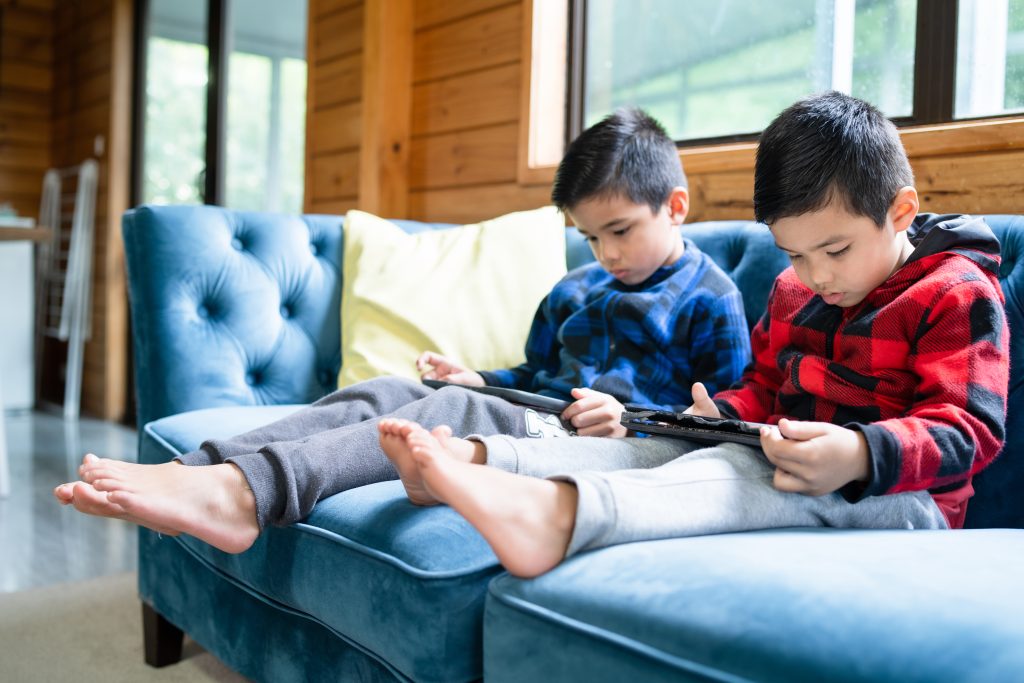
Screen time has been a topic of growing concern, especially with the wide availability of smartphones, tablets and other handheld devices. It is increasingly common to see a young child with an electronic device, which – quite frankly – can seem incomprehensible to a millennial doctor like myself. (Cue me joking, “Back in my day, our cell phones were analog and we had to walk uphill both ways to school.”)
Today, most American adults have a smartphone and many children learn to use those smartphones at a young age, eventually getting their own. Don’t get me wrong; for many reasons, this can be super helpful for parents and kids! We just need to be mindful with how much media these young minds are consuming. The American Academy of Pediatrics and the American Academy of Family Physicians recommend limiting screen time for kids when possible. For young children the following guidelines are recommended to restrict the use of electronic or digital media:
- For children ages 2 to 5, no more than 1 hour per day of screen time that includes high-quality programming.
- For children under 2, the only screen time should be video chats with family members or friends.
The American Academy of Child and Adolescent Psychiatry reports that, on average, children ages 8-12 spend four to six hours a day watching TV or using screens, while teens can spend up to nine hours a day watching a screen. And while social media is easily accessible, this is not saying kids are on TikTok or Instagram that whole time. (I hope not, anyway!) This often includes the amount of time spent on laptops or tablets for school, as children may need to access educational content and complete assignments electronically.
How much of an impact does screen time really have on my child’s well-being?
There is a lot of data that shows health risks in children increase as the amount of screen time for children increases.
Obesity
Obesity is a big health problem in the U.S. Approximately 1/3 of children and adolescents in the U.S. are either overweight or obese. A recent study from the Journal of Health, Population and Nutrition showed that children with the most screen time were more likely to develop obesity.
- One of the theories behind this correlation is that more time on screens results in a decrease in physical and creative activities, like playing outside, participating in sports and even reading a book.
- Screen time is also associated with increased absentminded snacking due to lack of attention to hunger cues when attention is intensely focused on something on a screen.
Sleep
For many reasons, poor or insufficient sleep affects 30% of toddlers, preschoolers and school-age children.
- One of the suspected reasons for lack of sleep in children is the normalization of handheld devices in the bedroom. First and foremost, having and watching a device or screen in the bedroom may end up pushing off a child’s bedtime, reducing the amount of sleep they should be getting each night …because we know kids don’t necessarily “sleep in” if they go to bed later! Second, the blue light emitted from these devices may decrease melatonin production in the brain, which can disrupt normal sleep patterns. Later bedtimes or interrupted sleep patterns means less time for restorative sleep that kids’ growing brains and bodies need.
- The American Academy of Pediatrics recommends children get regular sleep every night for restorative sleep to help make sure they’re healthy. Regularly sleeping less than the following recommended number of hours per day/night increases risk for attention, behavior and learning problems as well as accidents, injuries and health issues such as obesity and depression.
| Age | Recommend hours of sleep per night |
| 4-12 months | 12-16 hours (including naps) |
| 1-2 years | 11-14 hours (including naps) |
| 3-5 years | 10-13 hours (including naps) |
| 6-12 years | 9-12 hours |
| 13-18 years | 8-10 hours |
Mental health
High use of digital media has been linked to certain mental health concerns and, in some studies, even subsequent symptoms of ADHD. ADHD is admittedly a complex disorder that cannot simply be narrowed down to the use of screens and media, and it’s important to know research is still very new in this field. In the end, we need more information, but studies like this should make us pause and reflect about the longstanding behavioral effects of our high-tech world on behavior and development in children.
Age-appropriate media and parent involvement
I came across a pediatric behavioral health specialist at the Cleveland Clinic who made a compelling case for the importance of parent-child interactions especially as it relates to social media and screen time. Being engaged with your child when they are on any sort of media or device is key to them successfully navigating what type of content, programs, games, etc. are and are not appropriate.
Additionally, parents’ screen and social media use has a substantial impact on the quality of interactions with their children. Keep in mind that behavior speaks louder than words. Kids see what parents and older siblings do and they innately want to be like them, so being a good role model is also important.
So, what should I do as a mom?
DON’T PANIC! All the recommendations and advice out there for how to limit screen time can be overwhelming. Consider sticking to three basic rules:
- Limit screen time at least 1 hour before bedtime.
- Engage in screen time with your children; try to avoid using screens as an entertainment or distraction tool.
- Role model appropriate screen time behavior, and occasionally put down the phones altogether!
If you’re looking for a little more guidance, click here for a Family Media Plan from the American Academy of Pediatrics. This is available in English and in Spanish and is a way to help families prioritize what type of media they want to consume and how often. This may come in handy at certain times of the year like summer, holiday breaks or at the beginning of the school year.
As always, you can reach out to your child’s doctor with any questions you may have about their media use or health. If you’re looking for a new doctor, we have family medicine resident physicians who are accepting new patients at the Prevea Shawano Avenue Health Center – we’d be happy to help and look forward to caring for you and your children!
 Dr. Crystal Lalonde is a family medicine physician at the Prevea Shawano Avenue Health Center. She is one of the faculty physicians training our family medicine residents while also seeing patients of all ages, offering pregnancy care, childbirth and postpartum care for both mom and baby.
Dr. Crystal Lalonde is a family medicine physician at the Prevea Shawano Avenue Health Center. She is one of the faculty physicians training our family medicine residents while also seeing patients of all ages, offering pregnancy care, childbirth and postpartum care for both mom and baby.
Find more tips on getting your child to sleep better: Sweet Dreams: Tips to Help Kids Sleep

















